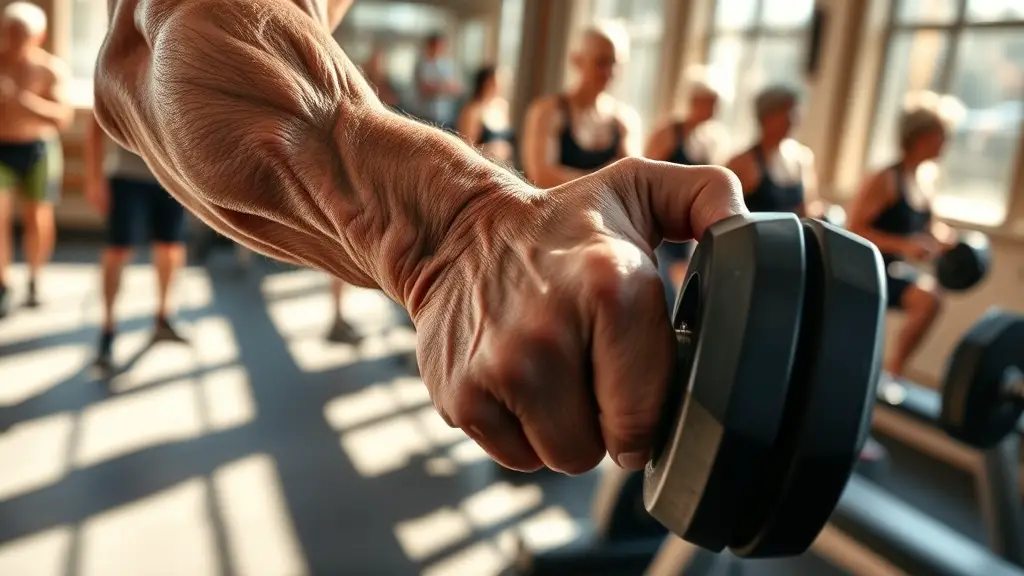The Science Behind Muscle Retention in Aging Gym-Goers

As you age, muscle retention becomes vital due to the natural decline in muscle fiber size and number, particularly fast-twitch fibers. Decreased protein synthesis and hormonal changes, like lower testosterone and growth hormone, further accelerate muscle loss. Engaging in resistance training stimulates muscle hypertrophy and improves strength, while a balanced diet rich in protein supports recovery and retention. By understanding these factors, you can better combat age-related muscle decline and enhance your fitness journey. Explore effective strategies for maintaining muscle mass.
Understanding Muscle Physiology and Aging

As you age, your muscles undergo significant physiological changes that affect strength and mass. The aging process leads to a reduction in muscle fiber size and number, particularly in fast-twitch fibers, which are essential for strength and power. This decline contributes to the overall strength decline observed in older adults, making daily activities more challenging. Additionally, the rate of protein synthesis within muscle cells decreases, further exacerbating muscle loss.
Physical activity plays a pivotal role in mitigating these effects. Engaging in resistance training can stimulate hypertrophy and maintain muscle fiber integrity, counteracting some of the age-related decline. Studies show that even moderate resistance exercise can enhance muscle mass and strength in older individuals. Understanding these physiological changes emphasizes the importance of remaining active, as consistent physical activity is vital for preserving muscle function and overall health as you age.
The Role of Hormones in Muscle Retention
Although aging naturally leads to hormonal changes that can impact muscle retention, understanding these shifts is essential for older gym-goers aiming to maintain their strength. Hormonal fluctuations, particularly in testosterone and growth hormone levels, play a significant role in muscle preservation. As testosterone levels decline, muscle mass can decrease, while increased estrogen effects may counteract some muscle loss. Engaging in activities like jumping rope can also help improve cardiovascular endurance, which is beneficial for maintaining muscle health.
| Hormone | Function in Muscle Retention | Aging Impact |
|---|---|---|
| Testosterone | Promotes muscle synthesis | Decreased levels lead to loss |
| Estrogen | Influences fat distribution | Increased levels can hinder gain |
| Growth Hormone | Stimulates tissue growth | Declines, reducing muscle repair |
| Insulin Sensitivity | Affects nutrient uptake | Deteriorates, impairing muscle gain |
| Cortisol | Stress hormone impacting recovery | Elevated levels can inhibit growth |
Impact of Metabolism on Muscle Mass

Metabolism plays an essential role in muscle mass maintenance, particularly for aging gym-goers who may experience declines in metabolic rate. As you age, your basal metabolic rate (BMR) typically decreases, which can result in reduced energy expenditure even during physical activity. This decline in metabolic rate can hinder muscle protein synthesis and promote muscle loss, a condition known as sarcopenia.
Additionally, lower energy expenditure means fewer calories burned, making it vital to adjust dietary intake to prevent unwanted weight gain and support muscle retention. Research indicates that engaging in regular resistance training can help counteract metabolic decline by stimulating muscle hypertrophy and enhancing metabolic rate.
To maintain muscle mass effectively, you should focus on a balanced diet rich in protein and incorporate exercises that elevate your overall energy expenditure. By understanding the impact of metabolism on muscle mass, you can develop a more effective strategy for preserving your strength as you age.
Effective Resistance Training Strategies
When considering effective resistance training strategies for aging gym-goers, it is vital to prioritize exercises that promote both strength and muscle retention. The following strategies can enhance your training regimen:
- Progressive Overload: Gradually increase the weight or resistance you’re lifting. This principle stimulates muscle fibers, leading to hypertrophy and improved strength.
- Training Frequency: Aim for at least three to four resistance training sessions per week, focusing on major muscle groups. Consistency in training frequency helps sustain muscle mass and combats age-related decline.
- Compound Movements: Incorporate exercises like squats, deadlifts, and bench presses. These multi-joint movements engage multiple muscles and optimize hormonal responses important for muscle retention. Additionally, including alternative exercises such as wall ball squats can provide variety and enhance overall leg strength.
Nutrition’s Influence on Muscle Preservation

Resistance training alone isn’t enough to guarantee muscle preservation as you age; nutrition plays a significant role in supporting your efforts in the gym. To optimize muscle retention, it’s important to focus on protein timing—consuming sufficient protein around your workout window can enhance muscle protein synthesis. Research indicates that spreading protein intake throughout the day, aiming for 20-30 grams per meal, can further support muscle maintenance.
Additionally, dietary supplements like creatine and branched-chain amino acids (BCAAs) have shown promise in preserving muscle mass among aging individuals. Creatine, in particular, may enhance strength and muscle performance, while BCAAs can reduce muscle soreness and promote recovery.
Incorporating these nutritional strategies not only complements your resistance training regimen but also provides your body with the necessary tools to combat age-related muscle loss effectively. Prioritizing both resistance training and nutrition is vital for long-term muscle preservation.
Frequently Asked Questions
How Does Hydration Affect Muscle Retention in Older Adults?
You know what they say: “You can’t pour from an empty cup.” Hydration’s essential for maintaining fluid balance, especially in older adults. Effective hydration strategies help preserve muscle retention by ensuring your body can efficiently transport nutrients and remove waste products. Without adequate hydration, you risk muscle fatigue and impaired recovery, which can hinder your fitness goals. So, staying hydrated isn’t just about quenching your thirst; it’s important for sustaining muscle health.
Can Stress Impact Muscle Preservation as We Age?
Yes, stress can greatly impact muscle preservation as you age. Elevated stress hormones like cortisol can disrupt muscle metabolism, leading to increased muscle breakdown and reduced protein synthesis. Chronic stress may also hinder your ability to recover from workouts, further impairing muscle retention. By managing stress through techniques such as mindfulness or exercise, you can help maintain your muscle mass and overall health as you grow older.
Are There Specific Supplements Beneficial for Aging Gym-Goers?
If you’re looking for specific supplements beneficial for aging gym-goers, consider incorporating protein synthesis enhancers like whey protein and creatine supplementation into your routine. Research shows that whey protein can effectively stimulate muscle protein synthesis, while creatine has been linked to improved strength and muscle retention in older adults. Together, these supplements can help counteract age-related muscle loss, supporting your fitness goals and overall well-being as you age.
What Role Does Sleep Play in Muscle Retention?
Sleep plays an essential role in muscle retention by affecting both sleep quality and sleep duration. During sleep, your body repairs and builds muscle tissue, and inadequate sleep can hinder protein synthesis, resulting in muscle loss. Research shows that poor sleep quality can elevate cortisol levels, which may further accelerate muscle degradation. Aim for 7-9 hours of quality sleep each night to optimize recovery and preserve your hard-earned muscle mass effectively.
How Can Mental Health Influence Physical Muscle Maintenance?
You might think your muscles only care about weights and reps, but mental health plays a vital role in physical muscle maintenance. Without exercise motivation, even the best workout plan falls flat. Emotional resilience can buffer stress, allowing you to stay committed to your fitness routine. Studies show that a positive mindset can enhance recovery and performance, making it clear that mental and physical health are intertwined in maintaining muscle mass effectively.





